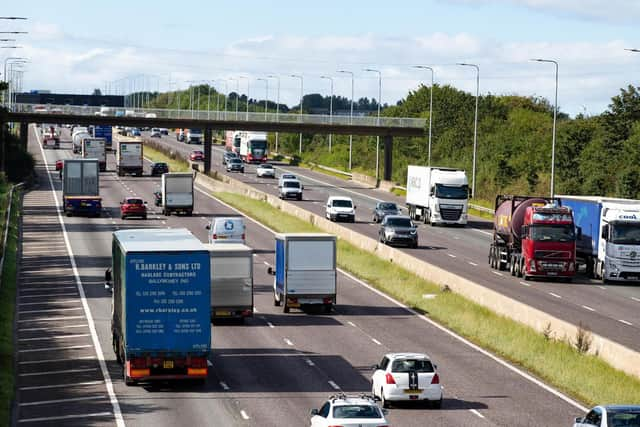These are the stretches of Calderdale roads to steer clear of to avoid traffic
and live on Freeview channel 276
The Department for Transport has released its latest statistics on average speeds and delays on England’s major routes.
With the data showing that traffic is becoming more sluggish across the nation, the RAC says drivers will be frustrated but not surprised.
Advertisement
Hide AdAdvertisement
Hide Ad

According to the figures, the two points where the slowest moving traffic was recorded among Calderdale's major roads in 2019 were:
M62 eastbound at the Hartshead Moor services between J25 and J26
M62 eastbound between J25 and J26
Drivers travelled at a mere 53.3 mph on average on parts of them.
At the other end of the scale, the M62 eastbound between J22 and J23 saw the fastest recorded traffic – motorists sped along part of it at an average of 68.5 mph.
Advertisement
Hide AdAdvertisement
Hide AdThe figures also show that road users faced the longest delays in the same sections of road where the lowest speeds were recorded.
They were held up on part of these by 16.4 seconds per mile on average, compared to the pace they would have made if travelling at the speed limit.
Across England’s major roads, the average speed was 58.8 mph last year, down from 59.4 mph in 2017.
Meanwhile, delays crept up over the period to an average of 9.5 seconds per mile.
Advertisement
Hide AdAdvertisement
Hide AdRAC spokesman Rod Dennis said: “Drivers will find it frustrating, but perhaps not surprising, that average speeds on England’s major roads are reducing.
"RAC research shows that in many parts of the country drivers are becoming more, not less dependent on their cars for the journeys they need to make, and it’s also the case that the network is now carrying record levels of road traffic.
"If you also factor in the impact of roadworks currently affecting so many busy stretches, such as on the M1 and M4, you have the perfect combination of conditions that will lead to slower traffic speeds.”
A DfT spokeswoman said: “This government is determined to improve journeys for all motorists, which is why we’re investing nearly £29 billion to reduce congestion on our roads up to 2025.
Advertisement
Hide AdAdvertisement
Hide Ad“Looking to the future, our £2.5 billion Transforming Cities Fund will help develop innovative public transport projects, while the tripling of our investment per head in cycling and walking since 2010 is encouraging people to try other ways of getting around – helping create less congested towns and cities.”
